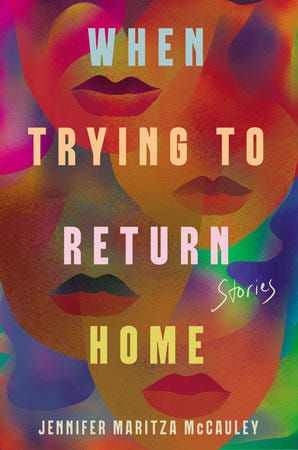Jennifer Maritza McCauley Returns Home
TMR Intern Audrey Dae Bush Interviews Jennifer Maritza McCauley, Author of the Debut Collection, When Trying to Return Home
Former Missouri Review contest and poetry editor Jennifer Maritza McCauley graced my laptop screen for a virtual interview shortly before I saw her in person at the 2023 Unbound Book Festival in Columbia. TMR is in the process of catching up with former staff members and interns like myself, and since the recent release of McCauley’s first published short fiction collection—what was once her doctoral dissertation here at MU—a lot of excitement has transpired for McCauley to fill us in on.
When Trying to Return Home has so far seen widespread celebration. As its title suggests, reckonings with metaphorical versus physical concepts of belonging are thematically plentiful; the narrator of “Liberation Day”—the collection’s finale—says she “always felt drenched in spirits and swamps of voices, enough so that she could end up anywhere, or nowhere,” and that she relies on “the Soft Space in her heart to guide her.” McCauley’s affinity for poetics (see her 2017 hybrid publication SCAR ON/SCAR OFF) stands out in her prose here, and so does her emotional relation to amorphous identity. But let’s let the talent do the talking…
(Questions and responses have been edited for readability.)
Audrey Dae Bush: How would you describe yourself?
Jennifer Maritza McCauley: I’m an assistant professor at the University of Houston - Clear Lake, and I teach creative writing and literature. I also describe myself as a writer, a poet and an editor, because I edit fiction at the literary journal Pleiades.
Audrey: You came to TMR when you were working on your PhD here at the University of Missouri - Columbia. Could you describe your time at TMR and what you did?
Jennifer: I started off as an intern—I think everyone starts as an intern—reading submissions. Speer [Morgan, editor in chief] asked if I would be the contest editor and I said yes, so that next year I was the contest editor and I did that for about two years. After that, I became the poetry editor and did that for two years. [...] I think my time there lasted from 2015 to 2020.
Audrey: What do you think were some skills—that TMR either built within you, or skills that you brought to TMR—that you think contributed to your overall learning experience?
Jennifer: Being able to assess a story and kind of determine when a character’s working, when a setting’s working, when a plot is working, or when it’s not working. Those are things that you learn through the experience of reading twenty stories per week—and during the contest, it’s even more stories than that! I think being exposed to that much contemporary literature and getting a sense of what Speer’s going to take, what he’s not going to take, and what we’re looking for as a journal are some great skills. They help you as a writer, too, because you think, “Okay, if this was a story being submitted to TMR, what would be working here and what would not be working here?” I think that’s what helped.
Audrey: Looking back now, what would you say is our “house style,” or the kind of work we like?
Jennifer: It seems like TMR likes the well-made story—the classic “beginning-middle-end” story—but I’ve seen them take experimental pieces before, braided narratives, things like that. [...] What I mean by [the well-made story] is a nineteenth century term that describes a kind of unification of character, plot, and mechanics. When I was a poetry editor, I don’t remember us getting that much experimental poetry in publishing; I remember there was a lot of narrative poetry, a lot of lyrical poetry.
Audrey: Did you ever find a particular piece that you really liked that ended up getting published?
Jennifer: Jamaica Baldwin I really loved a lot. I remember having multiple conversations about her with Speer, and she ended up getting published, so I was very excited about that. There were so many pieces, so it’s hard for me to just pick one. Tiana Clark, a finalist for the Editors’ Prize multiple times; Catherine Pierce we’ve also published and was really great; Tamara Titus—I think she won the first year I was an intern for the contest—is a wonderful writer.
Audrey: You work in multiple genres. Were there any differences between the ways you judged poetry and fiction?
Jennifer: Speer has told me that he wanted an “aboutness” in his stories and in poetry, that he wanted us to be able to clearly articulate what it was about by the end of the piece. That kind of challenged me a lot. When you pitch the pieces to him, he wants you to be very specific about why you like it, but he also wants you to be able to articulate why it has a certain sense of “transcendence,” why it goes beyond being just a well-executed piece, what makes it connect to the human experience. [...] So I was looking for that in both fiction and poetry. I think, sometimes, it’s like a relationship: when you read a piece, you just know there’s something striking you that you haven’t seen before. It can be the voice, the language, the character, the form. We saw a lot of poets playing around with form: Javier Zamora was amazing and played around a lot with form. We published him. [Overall] I think I was looking for that “transcendence” and “aboutness” in both of the genres.
Audrey: Talk a little more about the work you’re doing now. You’re an assistant professor—what kind of classes do you teach?
Jennifer I teach creative writing and lit: American literature, a Black women’s lit class, an Afro-Latine class, American modernism. For the undergraduate creative writing classes, I teach fiction, poetry, and nonfiction all together in one class, so students get to dabble in a lot of different genres. For the grad class, I teach primarily fiction and hybrid.
Audrey: Did you get to work with anyone from TMR in developing your recent short story collection, When Trying to Return Home?
Jennifer: Yeah, I was working on it the whole time I was at the University of Missouri and TMR. I workshopped a lot of the stories with Speer and he gave me a lot of great commentary.
Audrey: What’s it like to go from discussing your work in an academic context to wanting to publish it? How did that work?
Jennifer: I think I just felt that it was time to try to put [all those stories] out in the world. It was kind of a different experience. I sent it to my agent, and after she read it she said, “I definitely want to send this to publishers.” Then it was just an agonizing wait to see what was going to happen. I didn’t expect any reception—I thought it was going to get rejected—but the reception was really positive when we sent it out to publishers. It’s different being an author and a student, because you see your work as being constantly workshopped, and when you’re working with an editor on your short story collection, it’s a more intimate process. Also, after the workshop you feel like, “I can keep working on this,” but when the book’s done and sent to the printer you’re like, “Oh no, I can’t keep working on it anymore!” But I think I’ve finally transitioned to seeing myself as a writer.
Audrey: Anything else that comes to mind concerning your writing now? Do you have a current project or area of study?
Jennifer: My critical scholarship is in Afro-Latine studies, so I just finished a scholarly essay on that, and I have a novel that I’m working on. It’s with my editor right now, so we’ll find out if it’s going to get published or not within the next month. I’m working, writing poetry.
Audrey: How do you find time to do everything?
Jennifer: [Laughter] I get bored easily, so I wear a couple of hats to fill up the hours. It’s fun for me. I would do it if no one was paying me. And being a fiction editor for Pleiades is really gratifying, because I missed TMR a lot when I left.
It’s safe to say that TMR misses Jennifer Maritza McCauley as well. At the Unbound Book Festival, she read selections from her recent fiction collection and discussed “When Trying to Return Home:” both the poem it began as and the short story it bloomed into. McCauley also headed a moderated conversation with Dani Shapiro, in which the two discussed being “literary unicorns” of successful genre-crossing writing. For more, check out her interview with the Columbia Tribune and her website, jennifermaritzamccauley.com.




